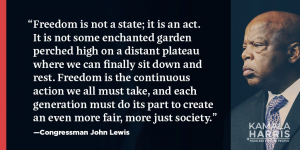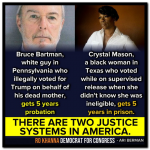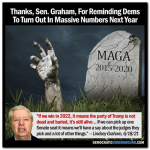- Joined
- Sep 27, 2020
- Messages
- 21,281
- Reaction score
- 17,532
- Gender
- Male
- Political Leaning
- Other
H.R.4 - Voting Rights Advancement Act of 2019

Passed House (12/06/2019)
Voting Rights Advancement Act of 2019
This bill establishes new criteria for determining which states and political subdivisions must obtain preclearance before changes to voting practices in these areas may take effect. (Preclearance is the process of receiving preapproval from the Department of Justice or the U.S. District Court for the District of Columbia before making legal changes that would affect voting rights.)
A state and all of its political subdivisions shall be subject to preclearance of voting practice changes for a 10-year period if (1) 15 or more voting rights violations occurred in the state during the previous 25 years; or (2) 10 or more violations occurred during the previous 25 years, at least one of which was committed by the state itself. A political subdivision as a separate unit shall also be subject to preclearance for a 10-year period if three or more voting rights violations occurred there during the previous 25 years.
A state or political subdivision that obtains a declaratory judgment that it has not used a voting practice to deny or abridge the right to vote shall be exempt from preclearance.
All jurisdictions must preclear changes to requirements for documentation to vote that make the requirements more stringent than federal requirements for voters who register by mail or state law.
The bill specifies practices jurisdictions meeting certain thresholds regarding racial minority groups, language minority groups, or minority groups on Indian land, must preclear before implementing. These practices include changes to methods of election, changes to jurisdiction boundaries, redistricting, changes to voting locations and opportunities, and changes to voter registration list maintenance.
The bill expands the circumstances under which (1) a court may retain the authority to preclear voting changes made by a state or political subdivision, or (2) the Department of Justice may assign election observers.
States and political subdivisions must notify the public of changes to voting practices.
The bill revises the circumstances under which a court must grant preliminary injunctive relief in a challenge to voting practices.

H.R.4 - 116th Congress (2019-2020): Voting Rights Advancement Act of 2019
Summary of H.R.4 - 116th Congress (2019-2020): Voting Rights Advancement Act of 2019
www.congress.gov
| House - 07/27/2020 Pursuant to the provisions of H. Con. Res. 107, enrollment corrections on H.R. 4 have been made. (All Actions) |
Voting Rights Advancement Act of 2019
This bill establishes new criteria for determining which states and political subdivisions must obtain preclearance before changes to voting practices in these areas may take effect. (Preclearance is the process of receiving preapproval from the Department of Justice or the U.S. District Court for the District of Columbia before making legal changes that would affect voting rights.)
A state and all of its political subdivisions shall be subject to preclearance of voting practice changes for a 10-year period if (1) 15 or more voting rights violations occurred in the state during the previous 25 years; or (2) 10 or more violations occurred during the previous 25 years, at least one of which was committed by the state itself. A political subdivision as a separate unit shall also be subject to preclearance for a 10-year period if three or more voting rights violations occurred there during the previous 25 years.
A state or political subdivision that obtains a declaratory judgment that it has not used a voting practice to deny or abridge the right to vote shall be exempt from preclearance.
All jurisdictions must preclear changes to requirements for documentation to vote that make the requirements more stringent than federal requirements for voters who register by mail or state law.
The bill specifies practices jurisdictions meeting certain thresholds regarding racial minority groups, language minority groups, or minority groups on Indian land, must preclear before implementing. These practices include changes to methods of election, changes to jurisdiction boundaries, redistricting, changes to voting locations and opportunities, and changes to voter registration list maintenance.
The bill expands the circumstances under which (1) a court may retain the authority to preclear voting changes made by a state or political subdivision, or (2) the Department of Justice may assign election observers.
States and political subdivisions must notify the public of changes to voting practices.
The bill revises the circumstances under which a court must grant preliminary injunctive relief in a challenge to voting practices.








